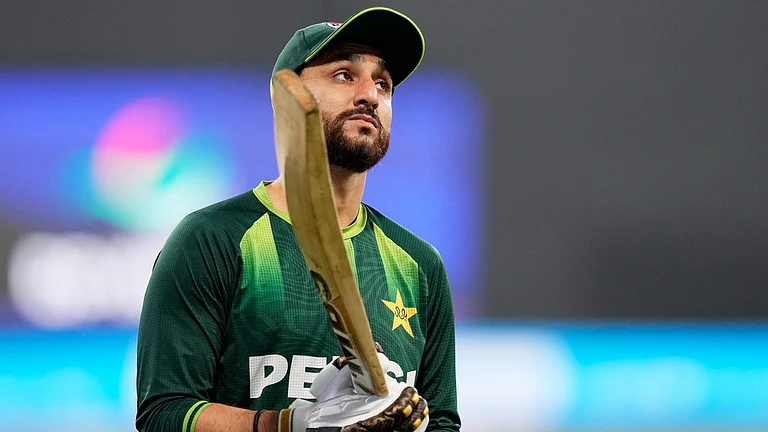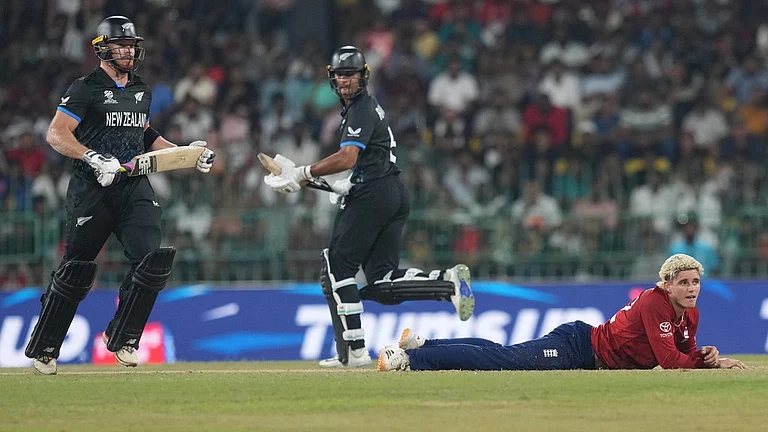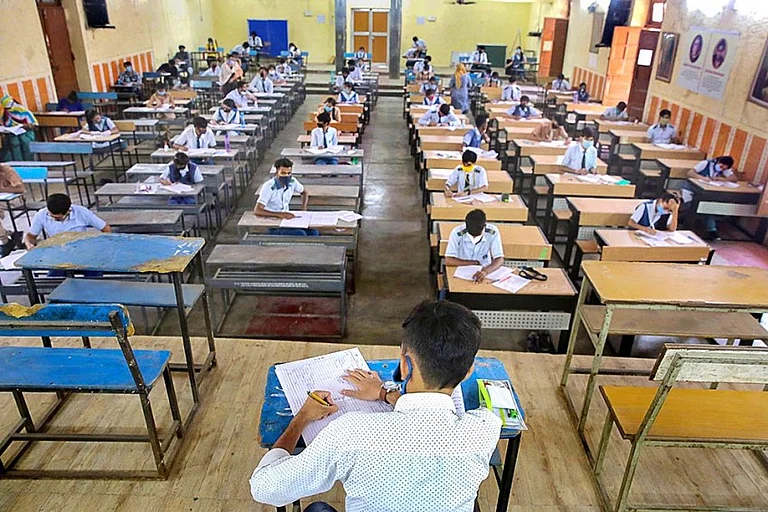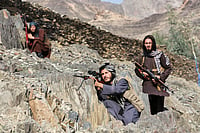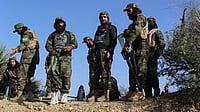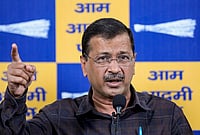On Indo-US ties: It has great priority with my government and President Bill Clinton, who enjoyed his encounter with Prime Minister Narasimha Rao during his US visit. The factors to keep in mind are that the US looks at the relationship with India from a number of dimensions. With the end of the Cold War and the near-simultaneous emergence of a global economy—an economy in which our interests are very deeply engaged—a new platform for a relationship is emerging in an economic sense. As American corporations sought to take advantage of the liberalised economic policies of your government to be able to play a role in India's development, to be trading and investing, including sales back to the US...we have seen an extraordinary increase in trade and investment. I believe this will continue as the Indian economy opens up further and India seeks partnerships and relations abroad. The change in the structure of the Indo-US relationship will take place in the economic sense. The US looks at post-Cold War developments as heartening, in the sense that the rivalry and the dangers inherent in the relationship between the US and the erstwhile Soviet Union are no longer there.
At the same time we face a world with a wider range of uncertainties and instabilities. Ourselves, you, Japan, China, Russia and Europe will all be primary actors shaping a new situation. This will take time to emerge. Therefore, political and security relationships are of enormous importance to us as we look at our ties with India. What will our capacity be as a world community to deal with ethnic and religious conflicts, terrorism, drug trafficking. Why can't we achieve common purposes between countries that have a body of shared principles as exists between the US and India, given the fact we are democracies? If we can't do it, who can? Does this mean we will see eye to eye on every issue? Being democracies, this is extremely unlikely.
On US interests in India: As democracies, we share many positive features but there are problems too. We are both very big countries with large intellectual communities, and the nature of the debate is fierce. The American has learnt over the last 50 years that his citizenship in the world is an absolute necessity but he hasn't learnt it easily, and he is tugged by this constant desire to go home again and attend to all the needs and demands of freewheeling democratic debate. In that sense we are always under threat to head inwards and to leave the rest of the world to its own devices. Similarly, India, with its own particular history and domestic imperatives, too is drawn inwards, tending to overlook the extraordinary political role you are fated to play. Britain, in its years in this country, looked at India in its strategic perspective that ran from somewhere between the coast of east Africa through central Asia and towards the Malacca Straits. This security parameter hasn't changed. The fundamental reality is that you are a great factor in this large region.
You have a deep interest in the evolution of modern China, the stability of the erstwhile Soviet Union, you have economic interests which impel you to be involved in Europe and the Pacific community. So the choice lies with the Indians, how they divide their time between domestic imperatives and India's global role. If there is to be stability in this awkward period of transition, there has to be a sense of partnership in seeking and maintaining it. In that sense, we look to India as an emerging great power. To occupy this place is a challenge to you, even more than it is a challenge for us. As India reaches out, it will find the US prepared to commit itself to engage with you positively.
On major issues of disagreement There are fundamental interests that underlie the relationship. This sum total of our interests will always exceed the sum of the parts of our disagreements. When we can learn to take disagreement in our stride, the maturity of the relationship is really tested—to see the whole and not get lost in parts. The overall reality will emerge, as it should, as a fundamental definition of the relationship as opposed to any fundamental differences on security, political or economic. The relationship is evolving on its own merits and at a quick pace. It is also achieving a continental and global dimension and our interests lie therefore, in a strong India, a successful India, a prosperous India. US interests are served by the success of this country.
On US-Pakistan ties: It has a historic feature closely linked to the Cold War. We felt threatened and imperilled, and we were looking for allies because of our own national security. In the post-Cold War period, while it is important for the US to preserve its friendship with Pakistan—a friendship I feel very comfortable with and very strongly about—it is of a different order, a different dimension from the one we are developing with India. Pakistan's internal stability is important. Its ability to influence events in this country and Afghanistan, its proximity to Iran and its links to West Asia, are all important. But it is of narrower reach than the Indian dimension from the American vantage point, which is one of global reach. We will develop and invest appropriately and proportionately in the two relationships. Of course, there is history which leaves us with some differences. Our view of present realities leaves us with some differences, we should touch on all those.
India is emerging as a major international trading partner, and it seems it will exceed the US as a rice exporter this year. As you become a major global player on the economic front, as you export more, the rest of the trading community—my nation included—will expect you to be a fair player and reduce your tariff barriers so that you are an importer, as that's the only way the international trading system and economy can function. Similarly, as you receive investment and become a major exporter, there will be points on which our trading interests may bump up against each other.
On the nuclear issue: The issue is how India defines her security and what she considers important for her security and the consequences of her decisions, as they affect the world, my country and others involved. Decades ago the US made a fundamental decision on calculating the consequences of the nuclear age. We set about to try to stabilise this nuclear age and—in the present, less stressful global context—to reduce the dangers of the nuclear age. We were active in the promotion of the Nuclear Non Proliferation Treaty (NPT), and are active in the promotion of the successor regimes and agreements that would strengthen them internationally. Our objective is to reduce the nuclear season, to bring down the nuclear phenomenon. Now India sees things from a very different vantage point, she has her security to look at and has seen threats to that security and has responded and developed options of her own. No American questions India's right to develop her own security options as she sees fit. We recognise that you have found it inappropriate, given your view of your circumstances, to become a member of the NPT.We would love to have you as a member of the NPT, but are realistic enough to know, given that you have taken a decision, you are not going to change it tomorrow or day after tomorrow. As the world tries to bring the nuclear pressure down, if India were to take any steps that appear to go in the opposite direction, that would have a global impact. But equally, even in your security neighbourhood, it could set off counter events which would increase the level of competition and increase dangers as we see it. It is perfectly reasonable to argue the costs and benefits as we assess them, as you argue costs and benefits as you see them. There is nothing unwholesome in the debate about the assessment of the dangers and advantages of any set of national security dispositions.
On the possibility of forging ties along the lines of US-Israel ties: I am shy of trying to compare India with any other country. Each country has different security perspectives. Israel is a much smaller country with virtually indefensible borders, and has a history of enormous wars in the Middle East. Israel has its own security perspective and that is changing in the context of the peace process that has been underway for some years. We have never accepted or condoned the existence of the nuclear option, but we understand how people get to one. We are looking to the day when that option is less necessary. India's circumstances are particular to India and you will not find us questioning your need to maintain your adequate national defence. But I hope over time you will emerge with greater clarity...there is a distinction to be drawn between further developments in the fields of weapons of mass destruction, nuclear weapons and their delivery system and real increments to national security. We do not believe that in our case further advances in those fields are in any way advantageous.
The present situation is difficult enough and we would like to see it reduced. Therefore, President Clinton has ended any further nuclear testing and production of fissile materials. Our objective is to build a consensus where this can be reduced even further. The nuclear age is not over, the fundamentals of India's security perspectives are therefore not totally changed. You have to assess as the world moves forward how you can move forward. We are committed...we would like to see the NPT regime expanded, there is the CTBT, the fissile material cut-off treaty. But these are all subjects we can talk about...In the past years India has itself expressed interest in global regimes like the fissile material and the CTBT. A range of constructive dialogue would help. We are not trying to weaken India and India is not about to surrender her sovereignty.
On India's position and its global implications: And the regional ones if you introduce new weapon systems. One or more of your neighbours is going to say that if India has it, we ought to have it. And it is reasonable that they should think in those terms. That is the way people happen to react. As you go up the line to weapons of mass destruction and their delivery systems, they are much more unstable. You can send a radio signal to a pilot and have him come back home. We have yet to send a radio signal to an intercontinental or intermediate range ballistic missile and tell it to come back.
On the Brown Amendment being a one-time exception to the Pressler Amendment: The Pressler Amendment, which was actively contested by the the executive branches as the invasion of the constitutional authority and prerogatives of the Presidency by two administrations, has now been accepted as the law of the land by the executive branch and the US Congress. It imposes discipline on our security relationship with Pakistan. Unless the issues the Pressler Amendment addresses and Pakistan's decision on nuclear option change, the Pressler Amendment is a fact that will dominate America's ability to engage in arms exports to Pakistan.
On the nuclear test controversy: I think matters like this are best discussed quietly between governments. And that's exactly what my government's policy is. On the growing number of people in India arguing for nuclear and missile options, it's worth weighing what some of the costs are, the domino or the copycat effect which can increase your security problems not decrease them, the way the world, not just the US, looks at you. I am alarmed that it all seems an Indo-US matter, it's hardly that.
On possible sanctions against India: Our law books are full of all kinds of legislations. The Glenn Amendment, different kinds of amendment, I prefer not to think that's the way we are headed.
On whether India has conveyed its opinion India's views have on the CTBT to the US: been articulated publicly. It has a lot of reservations about the CTBT regime. We have worked closely over the years to globalise the CTBT and I would like to think we can refine ways to make that past cooperation lively again.
On the CTBT being as discriminatory as the NPT: There is one piece which caught my attention while reading the Indian press: that somehow we are going to develop some wonderful weapon system using some smart computers. That's simply not the case. The point I made earlier is that the nuclear age is already dangerous enough, we want to get it down. We don't believe any further development of nuclear weapons will make any sense for us. We would like to think the world is going to move in this direction. We are not out to find discriminatory regimes that commit us to spin off more fanciful nuclear weapons.
On transfer of dual-use technology: The majority of the dual-use regimes grew up in the Cold War context. The Cold War is now over. In the past couple of years, there has been an enormous reduction in control on sensitive exports—notably in the field of computers where the ceilings have just gone way up. It's true as well of some telecommunications technologies. Between telecom and computers, approximately 85 per cent of the dual use trade took place. That said, we are parties to a number of international agreements and we have domestic legislations that support those like the Nuclear Suppliers Group and the Missile Technology Control Regime. The extent of high-tech trade between the US and India is absolutely tremendous right now. I can think of very few, if any, significant areas of India's development which have stopped at present. There seems to be an attitude that India's economic progress is being held in check by restraints on sensitive aspects of dual-use trade. That's just not so.








